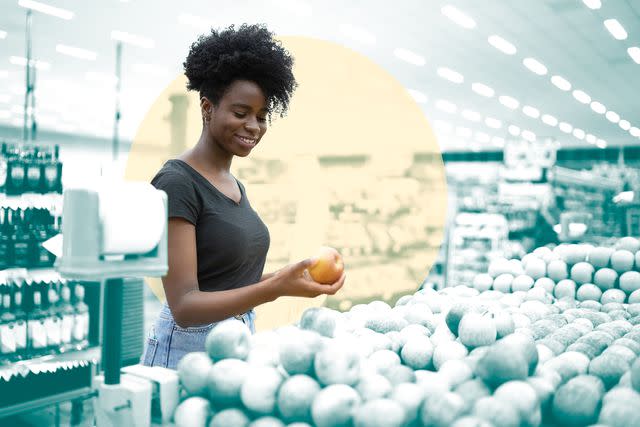I'm a Dietitian & I Don't Usually Buy Organic—Here's Why
To me, it’s not necessarily worth the higher price to buy organic fruits and vegetables.
Reviewed by Dietitian Lisa Valente, M.S., RD
Welcome to Thrifty. A weekly column where assistant nutrition editor and registered dietitian, Jessica Ball, keeps it real on how to grocery shop on a budget, make healthy meals for one or two, and make earth-friendly choices without overhauling your entire life.
I am a registered dietitian and I usually skip buying organic foods. Hear me out: I have a garden, I cook every day and I absolutely care a lot about that quality of the food I put in my body. That said, I don't think that an "organic" label directly translates to higher quality. In fact, I think sometimes it can get in the way of making the best food choices we can for our budget, preferences and situation. Here are a few reasons why I don't usually pay the extra money for organic foods, especially produce.
Conventional veggies are better than no veggies
The major issue with our preoccupation with organic versus conventional is that it can actually scare some people away from eating perfectly safe produce. Organic is not accessible for many people, especially if you are on a budget or your grocer doesn't carry it. I always choose to buy more fruits and veggies instead of spending more on organic to get less.
As research from the Journal of Toxicology illuminates, it might not even have any difference on your health risk. Plus, only one in ten Americans even meet the daily recommended servings of fruits and vegetables, so discouraging people to buy foods like strawberries and spinach if they aren't organic might be missing the point. The Safe Fruit and Veggies group is dedicated to encouraging people to eat produce that is both conventional and organic, and provides the most up-to-date news and information about the health benefits of produce, for more info.
The problem with the "Clean 15" & "Dirty Dozen"
You may be familiar with the Environmental Working Group's (EWG) "Clean Fifteen" and "Dirty Dozen" list, released every year in March. In theory, they use the Pesticide Data Program to identify which conventionally grown produce has the most pesticide residue (the dirty dozen) that they suggest you should buy organic and the fifteen "cleanest" fruits and vegetables that are fine to buy conventional. However, the EPA's rankings have come into hot water lately for how they interpret and frame their findings. Scientists have published studies and articles putting their rankings in perspective. A study published in the Journal of Toxicology found that the 12 foods in the "dirty dozen" contain negligible risk for consumers and that substituting organic forms of the 12 foods did not result in any appreciable reduction in consumer risk. They went on to say that the EPA's ranking method "lacks scientific credibility". Yikes. So does that mean these lists are a bad thing? Not inherently. But the context they need might not be transparently included in their report.

Organic certification isn't accessible for many small farmers
If you have spent time at your local farmers' market in the summer, you might have noticed that few (if any) small farms boast the organic label on their products. This is because becoming a certified organic grower is not accessible for many farms. It takes a lot of money, navigating the legal system and time that many individual growers don't have, even if they meet all of the standards of an organic operation.
Growers have to prove that they have been growing fully organically for three years, then have to submit an application and pay fees (which are often more than $825, plus $550 for each annual inspection) to the certifying agent. The bigger the farm or the faster you want to certification, the larger the fee (an expedited application costs $2,300, almost ten times more than the typical cost). Then the application is reviewed and, if it is approved, an inspector has to conduct an on-site inspection. The application and inspection are again reviewed and then, if everything is up to USDA standards, an organic certification is issued. The process is not realistic for many small farms.
Personally, I prefer to focus on locally grown and seasonal produce, which is surprisingly plentiful even here in Vermont. This can mean adjusting your taste buds to what is growing at the time, like eating more root vegetables and kale in the winters.
Bottom line
There may be environmental benefits to buying organic and it may be important to your family. However, you absolutely do not have to buy organic foods if you don't already, especially if you are on a budget. It is are more expensive, not always representative of farming practices and might not be any better for you. Instead, I choose to make my money go as far as possible by choosing conventional foods the vast majority of the time.
Read the original article on Eating Well.

